Dominica’s property market remains stable
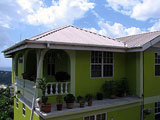 Dominica’s property market saw a number of challenges in 2014 but sales transactions remained steady, according to Safe Haven Real Estate. Most of the property sales were in the moderate price range of around US$400,000 to US$600,000.
Dominica’s property market saw a number of challenges in 2014 but sales transactions remained steady, according to Safe Haven Real Estate. Most of the property sales were in the moderate price range of around US$400,000 to US$600,000.
North Americans remained the top real estate investors, though there was increased interest from U.K. homebuyers and Dominicans living overseas.
Dominica’s capital city, Roseau, remains one of the most popular locations for foreign investors, especially in the Castle Comfort and Wall House areas.
Despite the fact that the property market remains restricted in Dominica because there are no direct international flights from the U.S., Canada or Europe, foreign investors are being enticed by its natural beauty and the introduction of the Citizenship by Investment Program (CIP), which is the most affordable in the world.
Dominica’s CIP allows foreign investors to acquire citizenship by purchasing approved real estate valued at a minimum of US$200,000. The property purchased must be held for at least 3 years and may be eligible for re-sale if owned for 5 years. Dual citizenship is allowed and there is no actual requirement to reside in Dominica before or after citizenship is granted.
There are no official records of house prices in Dominica, and reliable information on the property market is hard to find. However, based on some property listings, two to three-bedroom houses can be bought for an average price of US$500,000, depending on the location, area, quality of construction materials and other factors. For an instance, a three-bedroom house located Roseau measuring 3,129 sq. ft. is currently listed at US$650,000. On the other hand, a 4-acre land plos situated at Giraudel is priced at US$522,000.
Dominica’s real estate market is expected to remain stable this year and the coming years, amidst slow economic growth. The economy grew by just 1.1% last year, after y-o-y contractions of 0.9% in 2013, 1.4% in 2012, and 0.1% in 2011, according to the International Monetary Fund (IMF). The economy is expected to expand by 2.4% this year and by another 2.9% in 2016.
Tourists love Dominica’s rustic beauty
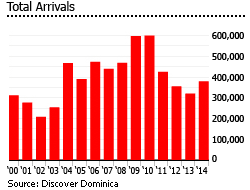
Today, Dominica is well known for the picture-perfect island in Pirates of the Caribbean 2 and 3. Publicity from these blockbuster movies has brought the island’s beauty to people’s attention worldwide.
Dominica’s tourism industry has blossomed, despite the lack of direct flights. Businesses like bars, restaurants, and hotels are happy, and locals look forward to seeing and hearing about the big “Pirates” celebrities like Johnny Depp, Keira Knightley, and Orlando Bloom.
In 2014, the total number of tourist arrivals soared by 18.2% to 378,812 persons from the previous year, based on figures from Discover Dominica. Among the more than 78,000 stay-over tourists, 54% came from other Caribbean states, 20% from the U.S. 6% from the U.K. and 3% from Canada.
However in Q1 2015, total visitor arrivals fell by 8.6% to 177,586 persons from the same period last year. While stay-over visitors were almost unchanged from a year ago, at 22,573 persons, cruise ship passengers dropped 10% to 148,635 persons.
In an effort to boost the tourism industry, the government has allocated an additional XCD2 million (US$ 740,741) to promote the country internationally.
Real estate tax cuts introduced
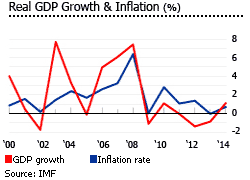
In July 2015, the government cut real estate taxes and introduced a number of VAT concessions in Dominica’s 2015/2016 National Budget.
The real estate tax changes include the following:
- Stamp duty will be reduced from 4% to 2.5%.
- The vendors´ fee of 2.5% will be abolished.
- The judicial fee will be reduced from 2.5% to 1%.
- An exemption from withholding tax on the rental income of villa owners will be introduced for a period of up to 10 years, for properties that are held for at least three years.
- A residential levy of XCD2,000 (US$740.74) per year will be introduced for the owners of villas in approved developments – those that meet the requirements outlined in the Hotels Aid Act, with a minimum investment of XCD3 million (US$1.1 million).
- The Alien Landholding Licence Act will also be amended so that, in place of the licence fee of 10% of the market value, a flat fee of XCD5,000 (US$1,852) will be applied, in addition to an application fee of XCD1,000 (US$370.37).
The following VAT changes were also unveiled:
- VAT exemption for meals provided to hotel and resort employees;
- VAT exemption for complimentary rooms provided by hotels and resorts for approved marketing activities;
- VAT exemption for capital goods for mixed-use resort developments, where part of the development will occur after the commencement of operations.
Moreover, the government is also planning to introduce a new legislation allowing for timeshares, condominiums and fractional ownership arrangements to further buoy the real estate market.
Quiet real estate market
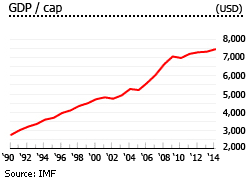
Dominica is the most mountainous and volcanic of the Caribbean nations. While right in the middle of the Caribbean, Dominica is not like its neighboring islands. It boasts not of boundless pristine beaches but of thick rainforests and several potentially active volcanoes. In place of beaches are numerous hot springs, rivers, and waterfalls.
The island is still very low-key. The mild increase in house prices is a response partly to the local economy, and partly to foreign interest.
The established quality residential areas are Canefield, Morne Daniel, Castle Comfort, and Belfast (north of Roseau). The average price of two to three-bedroom houses stood at US$500,000. Moreover, houses are also available for rent from US$370 and up, depending on the location.
Aside from having the lowest house prices in the region, Dominica also has one of the lowest GDP per capita growth rates in the Caribbean at just 8% in 2001-2005 and 5% in 2009-2014. GDP per capita stood at about US$7,400 in 2014, based on figures from the IMF.
Dominica uses the East Caribbean Dollar, which is pegged to the US Dollar at USD1 = XCD2.7.
Small and underdeveloped mortgage market
Dominica’s mortgage market remains small and underdeveloped, with only a few commercial banks offering mortgage loans to both locals and foreigners. Most real estate transactions are done cash.
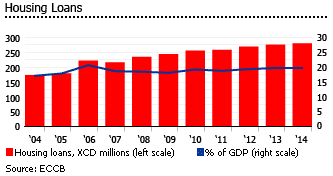
In 2014, the mortgage market was only about 19.6% of GDP. Housing loans outstanding actually increased 1.7% y-o-y in 2014, to XCD279 million (US$103.3 million), based on figures from the East Caribbean Central Bank (ECCB).
In the first quarter of 2015, total housing loans outstanding stood at XCD276.68 million (US$102.47 million), up slightly by 1.2% from a year earlier. About 71% of the total housing loans were drawn for home construction and renovation purposes while the remaining 29% were for house and land purchases.
As of April 2015, interest rates for residential mortgages in Dominica range from 6.75% to 8.5%, according to the ECCB.
Dominica’s Housing Revolution continues
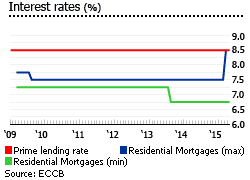
Prime Minister Skerrit introduced a ‘Housing Revolution’ in Dominica in 2005 to solve the housing shortage. In 2000, the country was in short of about 10,000 housing units and about 5,000 units were in need of repairs, according to Minister for Housing, Reginald Austrie.
The seven components of the Housing Revolution include the following:
- $12 million is being made available to Government Housing Loans Board (GHLB) and AID Bank, of which $3 million is allocated for the Home Repair and Maintenance Programme
- Installation of Washroom Facilities
- Purchase of model houses with assistance from the Government
- $3 million from China for the improvement of the housing stock in Carib Territory
- Shelter Development Programme administered by AID Bank on behalf of Government, which enables the grant of loans to individuals earning less than $1,000 monthly and couples earning less than $150,000 monthly.
- Squatter Regularization Programme, where families can buy land in squatter areas for XCD$1 per sq. ft. Over 175 families have benefited from this programme since its launched in 2005.
The much-needed program had been long delayed due to Dominica’s poverty. The Government of Venezuela granted 22 million dollars for Dominica’s housing development, and a soft loan of 7.3 million dollars at 2% per annum will follow. The Chinese Government is granting 3 million dollars.
Over the past five years, the government has spent more than XCD20 million in repairs and renovated about 4,000 homes under the programme.
“The Government intends to continue to work with our citizens to facilitate wherever and however possible, to ensure that every Dominican has an acceptable housing standard,” said PM Roosevelt Skerrit.